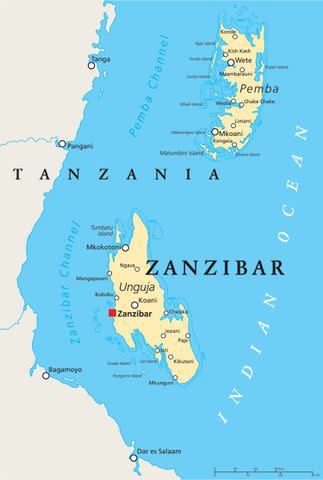8 Children and 1 Adult Dead — and 78 Sickened — After Eating Sea Turtle Meat
Consuming sea turtle meat can cause chelonitoxism, a type of fatal food poisoning that has no cure

Getty
Stock image of a sea turtleEight children and 1 adult have died after eating sea turtle meat, which sickened an additional 78 people
The deaths occurred on Pemba Island in the Zanzibar Archipelago, where it is considered a delicacy, even though it can cause a rare type of food poisoning called chelonitoxism
There is no treatment for chelonitoxism, as the toxin which causes it has not been identified yet
Eight children and one adult have died after eating sea turtle meat in Pemba Island in the Zanzibar Archipelago. Authorities said an additional 78 people were sickened and hospitalized from eating the meat, according to the Associated Press.
The outlet said they died from chelonitoxism, a type of food poisoning that only occurs from eating sea turtles. The meat is considered a delicacy.
“Chelonitoxism (sea turtle meat poisoning) is a rare and sometimes fatal type of food poisoning caused by eating marine turtles,” according to the National Library of Medicine.
“Studies show that all parts of the sea turtle are potentially toxic. Symptoms can be as mild as nausea and vomiting to more severe forms of neurologic manifestations, coma and ultimately death.”

According to Mkoani District medical officer, Dr. Haji Bakari, the adult who died was the mother of one of the children who had died from eating the turtle meat. Bakari told the AP that laboratory tests confirmed that everyone who died had eaten the sea turtle meat.
“Chelonitoxism is caused by eating sea turtle meat contaminated with chelonitoxins, which are thought to accumulate from the environment without affecting the turtle,” the National Library of Medicine says. “Initially, gastrointestinal symptoms occur, followed by neurologic, hepatic and renal toxicity.”

Getty
Stock image of seat turtles on a beachThe outlet adds that infants can become sick, or even die, if they are breastfed by a mother who has chelonitoxism.
According to the National Library of Medicine, “as the pharmacology or chemistry of the toxin is still unknown, antidote or treatment to chelonitoxism is unavailable.” As Sky News pointed out, only “supportive care” — such as intravenous fluids — can be offered.
In 2021, the BBC reported that local authorities had banned the consumption of turtle meat after seven people, including a 3-year-old, died from chelonitoxism.
The AP says a disaster management team, led by a Hamza Hassan Juma, from Zanzibar’s House of Representatives, has been sent into Zanzibar to urge people to stop eating sea turtles.
Never miss a story — sign up for PEOPLE's free daily newsletter to stay up-to-date on the best of what PEOPLE has to offer, from juicy celebrity news to compelling human-interest stories.
For more People news, make sure to sign up for our newsletter!
Read the original article on People.


